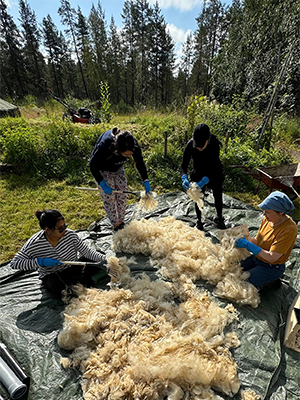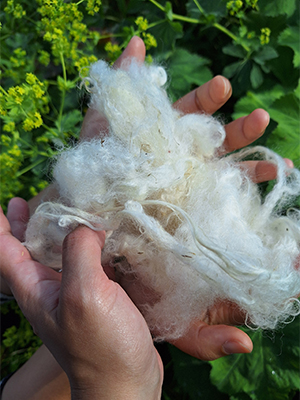The architectural proposal The Finnish Yurt is one part of the award-winning Felted Futures design concept. The Finnish Yurt was designed by Hanieh Ahmadi in collaboration with Lola Cervantes. Photo: Lola Cervantes, 2024.
A team from the Faculty of Art and Design at the University of Lapland has won the international This is Bioeconomy award. Their winning concept explores the use of raw wool in rural tourism environments.
A group composed of students from the Master's programme of Sustainable Art and Design and the VillaInno project was awarded an international This is Bioeconomy prize in Hungary last week. The award was granted by an EU-funded Engage4BIO initiative, and it recognizes innovative bioeconomy solutions.
The competition entry of the University of Lapland's team is called Felted Futures, and it explores the use of raw wool in rural tourism environments. Felted Futures is a design concept for a lightweight architectural shelter covered with wool felt.
The concept has been carried out as a co-design process in which a wool felted shelter combines indigenous knowledge and contemporary design principles. The work combines traditional horse-felting technique with modern applications, as well as architecture, textile design, bio-based and sustainable materials, indigenous knowledge and cultural significance. At the same time, the work presents solutions for circular economy practices in rural areas.

The team sorting wool in Äkäslompolo, summer of 2024. Photo: Dorsa Abolfazli, 2024.
The awarded team includes students Hanieh Ahmadi, Fian Arrafiani, and Dorsa Abolfazli from the Master's degree programme of Sustainable Art and Design. The team was led by designer Lola Cervantes, who worked within the VillaInno project, with additional support from Maria Huhmarniemi, the responsible lead of the VillaInno project.
"We are truly delighted with this recognition and the collaboration we carried out last summer at our wool camp at the Navetta Gallery in Äkäslompolo," states Lola Cervantes.
"Our project highlights the combination of traditional craftsmanship and contemporary aesthetics, as well as the significance of soft architecture, bio-based materials, and co-design. Our work demonstrates how traditional craft techniques can inform contemporary architectural solutions to promote sustainable, resilient, and culturally meaningful design in the Arctic region."
The award ceremony was held at the Moholy-Nagy University of Art and Design (MOME) in Budapest on 26 March 2025. Designer teams from the Finnish universities performed well in the competition overall: a student team from the Aalto University secured the second place in the competition.

Raw wool fibers from Finnsheep breed. Photo: Lola Cervantes, 2024.
This is Bioeconomy Award
The international This is Bioeconomy Award sought innovative, bio-based solutions that highlight the potential of biodesign in creating a sustainable future. The competition rewarded innovative and impactful design solutions that address environmental challenges and drive the transition to a bioeconomy.
The competition was open to students, early-career professionals, and enthusiasts in design, architecture, engineering, and related fields worldwide, aged 18 to 35. It was arranged by the Engage4BIO initiative.
VillaInno project
The VillaInno project aims to improve the innovation capacity of small and medium-sized enterprises in Lapland within the context of crafts and cultural tourism by revitalizing craft heritage.
Wool, as a material, has the potential for use in architectural and construction materials by utilizing locally available, discarded, unprocessed wool. This approach applies sustainable and environmentally friendly methods while revitalizing traditional craft techniques.
The project started in 2023, and it is still ongoing until the end of April 2026. The project is co-funded by the European Union.
More information:
Lola Cervantes, fabiola.cervantes (at) ulapland.fi
Award news on the Engage4BIO website